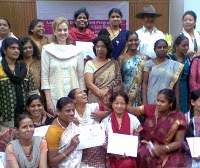Kigali: Spread the word and help at-risk women who receive services the government of Rwanda has put in place. Read full article here.
Content Type
The Ministry of Health in partnership with Imbuto Foundation, this week, launched a campaign to eliminate MTCT of HIV/AIDS, with a target to reduce the transmission rate at birth to below 2 percent by 2015. Read full article here.
 I am Manisha and I have been HIV+ for the last 8 years. I came to know of my status in 2002 when my husband fell sick. I had not known that he was HIV+. Even when he told me, I did not take it very seriously as I had no knowledge about this disease and took it as a common ailment like TB or malaria.…
I am Manisha and I have been HIV+ for the last 8 years. I came to know of my status in 2002 when my husband fell sick. I had not known that he was HIV+. Even when he told me, I did not take it very seriously as I had no knowledge about this disease and took it as a common ailment like TB or malaria.…
This publication compiles and summarizes evidence to support successful interventions in HIV programming for women and girls. This is a comprehensive review, spanning 2,000 articles and reports with data from more than 90 countries, that highlights a number of interventions for which there is substantial evidence of success: from prevention, treatment, care and support to strengthening the enabling environment for policies and programming…
I am Muthukani (29 years old). My husband is a driver. He was affected by HIV. I have two children, both girls. My younger daughter is HIV positive. In 2005 at a government ART centre, I was approached by an outreach worker of the Positive Women Network (PWN+). I began to regularly attend support group meetings and receive counselling on taking care of my family’s health.
In 2006, I heard that PWN+ was initiating Social Light…
Diamonds: Stories of Women from the Asia Pacific Network of People Living with HIV is a compilation of the personal narratives of ten women and one girl who are HIV-positive. The publication is accompanied by a documentary that focuses on four of these stories.
Trailer can be viewed on-line here.
By ignoring the family planning side of HIV/AIDS prevention and treatment, the international community is failing girls in developing countries. Read full article here.
When my husband died because of some diseases related to HIV, I thought I had lost everything. At that time I didn’t know about HIV, and my younger child and I tested positive for HIV. When I saw my son was seriously ill with TB, I felt he would die very soon. I didn’t know where I would go for medicines and other support. I really got angry with my husband who gave us this disease. My daughter is ‘negative’, so I know my in-laws will take…
At the fourth United Nations Conference on the Least Developed Countries, member states met to discuss objectives and targets for the next decade including gender equality and empowerment. Read full article here.
If those who test positive can be put on drugs straight away to protect their own lives and that of their partner's, the stigma and fear associated with HIV must begin to lift.
Read full article here.
Researchers report yet more tantalizing data that the antiretroviral drugs doctors currently use to treat HIV infection could also be effective in preventing transmission of the virus. Read full article here.
Women at high risk of HIV/AIDS have not received adequate education to protect themselves from the virus, a conference on the subject heard yesterday.
Read full article here.
Environment Impact Assessments (EIA) will be expected to address HIV/AIDS and gender issues in the future after the National AIDS Coordinating Agency (NACA), together with other SADC countries complete an ongoing project that intends on finding ways of integrating these issues into the EIA.
Read full article here.
The World Health Organization’s (WHO) new recommendation for the extended use of triple drug antiretroviral prophylaxis for mother and infant is highly cost-effective compared to the current short-course two drug therapy for the prevention of mother-to-child transmission (PMTCT) in Nigeria.
Read full article…